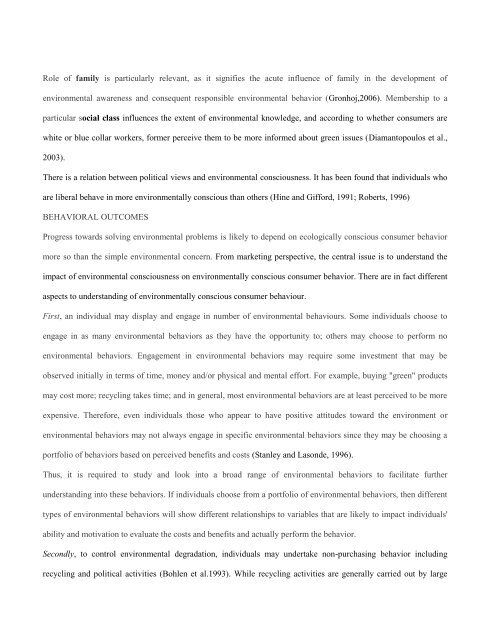- Page 1 and 2:
Proceedings2012 ACADEMY OFINDIAN MA
- Page 3:
Anna-Lena Ackfeldt and *Neeru Malho
- Page 6 and 7:
A few studies have explored audienc
- Page 8 and 9:
Referring to Table II, data also re
- Page 10 and 11:
Table I.Descriptive statisticsMean
- Page 12 and 13:
Developing a Conceptual Framework f
- Page 14 and 15:
1. IntroductionLuxury has its origi
- Page 16 and 17:
Figure 1: Dimensions that different
- Page 18 and 19:
(India and China to spur luxury gro
- Page 20 and 21:
(―Premium Brands Luxuriate in Chi
- Page 22 and 23:
use of these forms of money for lux
- Page 24 and 25:
the latest additions to the brands
- Page 26 and 27:
Western individualism (Ramamoorthy,
- Page 28 and 29:
watches to satisfy themselves and t
- Page 30 and 31:
It may be stated that the different
- Page 32 and 33:
―JWT releases first ever study on
- Page 34 and 35:
Wiedmann, K. P., Hennings, N. and S
- Page 36 and 37:
(Source: TRAI)India is the second l
- Page 38 and 39:
suggested that benchmarking of the
- Page 40 and 41:
Kapoor 1 reported that business sub
- Page 42 and 43:
The parameters for which the respon
- Page 44 and 45:
Four factors were extracted, togeth
- Page 46 and 47:
DiscussionThe key insights from the
- Page 48 and 49:
eturn on marketing investment. Reta
- Page 50 and 51:
What is Proximity marketing?Proximi
- Page 52 and 53:
Conjoint AnalysisFor identifying di
- Page 54 and 55:
Government service/ retail organiza
- Page 56 and 57:
Local franchisees too prefer the re
- Page 58:
Adoption of alternate Technologies-
- Page 63 and 64:
ooth_campaign.htmlMcGovern, G.J., C
- Page 65 and 66:
Smirnova Maria, 0079217505094, smir
- Page 67 and 68:
strategy, the less might be importa
- Page 69 and 70:
CustomerorientationH1aPlatforminnov
- Page 71 and 72:
Morgan, R.E. & Berthon, P. (2008).
- Page 73 and 74:
judged. On the other hand, Brand (1
- Page 75 and 76:
hairstyles are ‗Afro-centric‘ o
- Page 77 and 78:
METHODSubjectsConvenience sampling
- Page 80 and 81:
Use of hair extensions a symptom of
- Page 82 and 83:
When asked to state their reasons f
- Page 84 and 85:
The third most predominant reason f
- Page 86 and 87:
Khumalo, N.P., Jessop, S., Gumedze,
- Page 88 and 89:
that influence the diffusion of gra
- Page 90:
future studies. Perry (1998) has br
- Page 93 and 94:
acquired during times of a bad catc
- Page 95 and 96:
innovation. The adopter might be in
- Page 97 and 98:
availability to the adopter, (2) la
- Page 99 and 100:
affective responses through nonverb
- Page 101 and 102:
Researchers acknowledge that advert
- Page 103 and 104:
markets as a form of sexual appeal
- Page 105 and 106:
constant, sexual illustrations had
- Page 107 and 108:
Table 2Categories and Proposed Cate
- Page 109 and 110:
construct Definition Examples of PV
- Page 111 and 112:
of understanding the type of persua
- Page 113 and 114:
Hovland, R., MacMahan, C., Lee, G.,
- Page 115 and 116:
Role of Gratitude and Obligation in
- Page 117 and 118:
obligation. Therefore, it is impera
- Page 119 and 120:
development of long term business r
- Page 121 and 122:
fulfilment of their desire for reco
- Page 123 and 124:
intentional, it has incurred some c
- Page 125 and 126:
This study is intending to use surv
- Page 127 and 128:
Cannon, Joseph P., Ravi S. Achrol,
- Page 129 and 130:
Martin, C. A. & Bush, A. J. (2000).
- Page 131 and 132:
Can we manage the influence of role
- Page 133 and 134:
Affective commitment (AC) refers to
- Page 135 and 136:
transactional theory,we draw upon t
- Page 137 and 138:
RESULTSConsistent with prior resear
- Page 139 and 140: empowerment are perceived to be hig
- Page 141 and 142: Agarwal, Sanjeev and Sridhar N. Ram
- Page 143 and 144: Meyer, John P. and Natalie J. Allen
- Page 145 and 146: TABLE 1CORRELATIONS FOR THE CONSTRU
- Page 147 and 148: &Prof Geoff Bick(E: geoff.bick@gsb.
- Page 149 and 150: and Reinartz, 2006) and sales (Ahea
- Page 151 and 152: The discourse on CRM has made a tre
- Page 153 and 154: These studies demonstrate that impl
- Page 155 and 156: 3. Conceptual frameworkThis section
- Page 157 and 158: This approach is fully supported by
- Page 159: The table below presents the verbat
- Page 163: given by respondents are given in t
- Page 166 and 167: With regards toinstitutional factor
- Page 168 and 169: REFERENCESAhearne, M., Rapp, A., Ma
- Page 170 and 171: (5), pp.485-508Gupta, S., Lehmann,
- Page 172 and 173: RIA Policy Brief N.1, pp1-4.Scott,
- Page 174 and 175: In order to understand individual c
- Page 176 and 177: Research DesignResource based view
- Page 178 and 179: Frank H.A. and D‘Souza J. (2004),
- Page 180 and 181: Yang Q., Mudambi R. and Meyer K.E.
- Page 182 and 183: INTRODUCTIONPeople in various parts
- Page 184 and 185: More importantly, environmental con
- Page 186 and 187: However, a number of studies have i
- Page 188 and 189: pro-environmental behaviour.ANTECED
- Page 192 and 193: was further revealed that though co
- Page 194 and 195: This paper provides comprehensive f
- Page 196 and 197: Lepisto, L. R. (1974). An Empirical
- Page 198 and 199: Zimmer, M., Stafford, T. F., and St
- Page 200 and 201: HypothesesCSP and Brand Equity: Ins
- Page 202 and 203: Rural Penetration of Life Insurance
- Page 204 and 205: life) held by an Indian consumer is
- Page 206 and 207: the state of Andhra Pradesh, micro
- Page 208 and 209: The data wascollected from the agen
- Page 210 and 211: The percentage of ULIP business to
- Page 212 and 213: public sector LIC has many satellit
- Page 214 and 215: Significance of t-test is less than
- Page 216 and 217: Significance of t-test is less than
- Page 218 and 219: Physical presence of at least satel
- Page 220 and 221: Examining the association between G
- Page 222 and 223: Cross-tab analysis of economic gree
- Page 224 and 225: Holbrook, M. B. (1986). Emotion in
- Page 226 and 227: Model 2 - Formative Second Order Fa
- Page 228 and 229: We used a 2-step structural equatio
- Page 230 and 231: Measurement Model Misspecification
- Page 232 and 233: DR. RAJNISH JAINAssociate Professor
- Page 234 and 235: Modern retailing is aimed at facili
- Page 236 and 237: and further reported that mood, inv
- Page 238 and 239: strong feelings of pleasures from s
- Page 240:
Scale Development: Scientific proce
- Page 243 and 244:
Confirmatory Factor Analysis: Explo
- Page 246 and 247:
DISCUSSION
- Page 248 and 249:
Retail customer experience is a ref
- Page 250 and 251:
Diep, V. and Sweeny, V. (2008), ―
- Page 252 and 253:
Sandstorm, S., Edvardsson, B., Kris
- Page 254 and 255:
2. LITERATURE REVIEW2.1. Competing
- Page 256 and 257:
customer satisfaction (Bolton 1998,
- Page 258 and 259:
To account for common method varian
- Page 260 and 261:
elevant in emerging markets, it als
- Page 262 and 263:
other distribution systems, who (c)
- Page 264 and 265:
Deighton 2009) from the marketer to
- Page 266 and 267:
some of the leading academic resear
- Page 268 and 269:
Schultz, D., and Charles Patti (200
- Page 270 and 271:
Coping With Service Failure: The mo
- Page 272 and 273:
stress. Secondary appraisal relates
- Page 274 and 275:
Prior studies have extensively stud
- Page 276 and 277:
the disparaging effects of service
- Page 278 and 279:
students were recruited from variou
- Page 280 and 281:
Main effects of brand reputationRes
- Page 282 and 283:
The main objective of this study wa
- Page 284 and 285:
customers reason out the potential
- Page 286 and 287:
There are several limitations to th
- Page 288 and 289:
Smith, A. K., Bolton, R. N., & Wagn
- Page 290 and 291:
QuickTime and adecompressorare need
- Page 292 and 293:
QuickTime and adecompressorare need
- Page 294 and 295:
Brand Communities on Social Network
- Page 296 and 297:
The social networking site revoluti
- Page 298 and 299:
strategy due to its impact brand tr
- Page 300 and 301:
QuickTime and adecompressorare need
- Page 302 and 303:
QuickTime and adecompressorare need
- Page 304 and 305:
QuickTime and adecompressorare need
- Page 306 and 307:
QuickTime and adecompressorare need
- Page 308 and 309:
Cova, B., & Pace, S. (2006). Brand
- Page 310 and 311:
Spectator-Based Brand Equity and In
- Page 312 and 313:
(www.gallup.com) in mid 2009, it wa
- Page 314 and 315:
Team-branding, thus, becomes an imp
- Page 316 and 317:
students. These items were measured
- Page 318 and 319:
QuickTime and adecompressorare need
- Page 320 and 321:
QuickTime and adecompressorare need
- Page 322 and 323:
Gladden, J.M. and Funk, D.C. (2002)
- Page 324 and 325:
Impact of Sensory Branding on Consu
- Page 326 and 327:
were selected by the consumers with
- Page 328 and 329:
Reaction to Advertisements and Bran
- Page 330 and 331:
„service‟ as ―an act or perfo
- Page 332 and 333:
proposed attributes that customers
- Page 334 and 335:
QuickTime and adecompressorare need
- Page 336 and 337:
QuickTime and adecompressorare need
- Page 338 and 339:
There are some limitations inherent
- Page 340 and 341:
SERQUAL Scale‖, Journal of Retail
- Page 342 and 343:
capabilities for stakeholder engage
- Page 344 and 345:
arrived at a consensus. Independent
- Page 346 and 347:
different levels of government to p
- Page 348 and 349:
NGOs and CBOs. In addition, the cor
- Page 350 and 351:
the information generated at each l
- Page 352 and 353:
A nation‘s capacity embodies the
- Page 354 and 355:
―…there is a lot of good work b
- Page 356 and 357:
manifested in many forms. Following
- Page 358 and 359:
Grindle, M. 1996. Challenging the S
- Page 360 and 361:
impacts of message concreteness in
- Page 362 and 363:
2004; Lee, Keller, and Sternthal 20
- Page 364 and 365:
Second, to examine the manipulation
- Page 366 and 367:
The message concreteness manipulati
- Page 368 and 369:
instructions) to different kinds of
- Page 370 and 371:
Processing: Review and Extensions,
- Page 372 and 373:
May, 2012a. Lillian L. Cheng, Cheng
- Page 374 and 375:
senses from experiences. It is a ba
- Page 376 and 377:
Acceptability and the Type of Infor
- Page 378 and 379:
IntroductionRetail banking is an es
- Page 380 and 381:
servicescape of retail banks in Sin
- Page 382 and 383:
specific aspects of service environ
- Page 384 and 385:
commenting in 1970 that ―For bran
- Page 386 and 387:
well as NSSM theory leaves signific
- Page 388 and 389:
experience inside the servicescape
- Page 390 and 391:
QuickTime and adecompressorare need
- Page 392 and 393:
Several observational visits were p
- Page 394 and 395:
spending your time there. I don‘t
- Page 396 and 397:
‗Our bank is located in the centr
- Page 398 and 399:
That servicescape can be utilized s
- Page 400:
McGivern, Y. (2006). The Practice o




